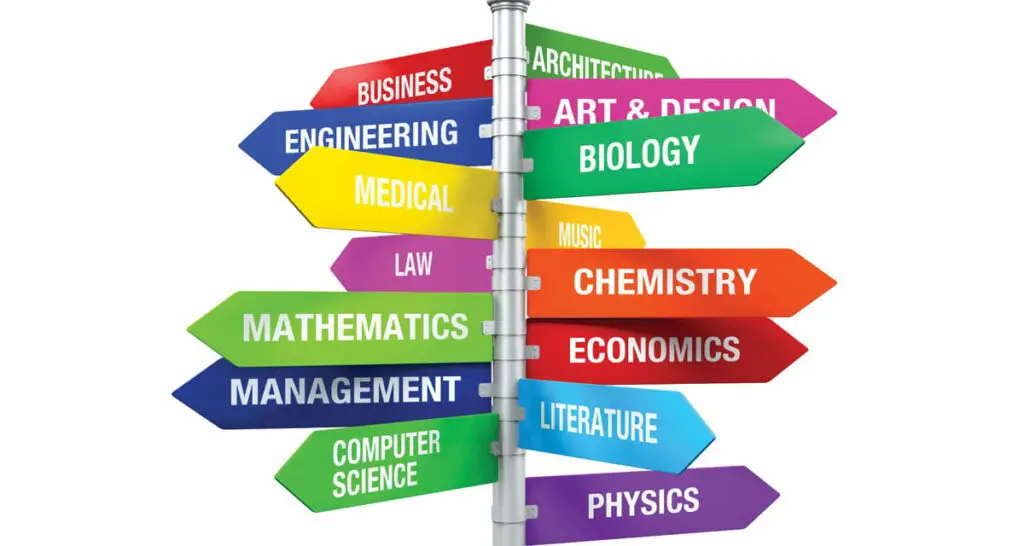After completing high school, US students can continue their academic path in college. 12th graders can get an associate’s after two years of college or be rewarded with a bachelor’s degree to complete a four-year academic course. Both options refer to undergraduate studies.
While an associate degree program can prepare you for a technical or vocational profession, it can also be the next step to your bachelor’s degree. The second option is the general studies approach, which means you have to complete compulsory courses before focusing on your major.
What Subjects Are Included in Gen Eds
Required courses, general courses, General Education, or Gen Eds are different names of the group of basic subjects that students have to learn. This curriculum was also called a liberal education in the past because it included subjects from liberal arts. So, Gen Eds subjects require knowledge of history, English, math, and science. However, the precise subject titles, as well as their combinations, can differ from college to college. Let’s look at gen eds disciplines in more detail:
Math
Most programs require students to complete 1-2 math subjects out of these:
– statistics
– calculus
– geometry
– algebra
– trigonometry
– quantitative analysis.
English
Almost every college will need you to have both courses assigned:
– College composition
– English composition.
Social Sciences
These sciences give you insights into human nature and our communication with each other. This section includes:
– history
– sociology
– psychology
– anthropology
– government
– economics
– geography
– political science.
Natural Science
Natural science gives you an understanding of the matter around us. Typically, students need to choose 1-3 subjects among the following:
– oceanography
– astronomy
– physics
– environmental science
– geology
– anatomy and physiology
– biology
– chemistry
– ecology.
Diversity
These types of classes help students find out other beliefs and cultures. They can comprise:
– social responsibility
– religion
– cultural diversity
– world religions.
Humanities
Humanities help you learn how people can express their culture. The list of subjects covered by humanities title can vary across colleges, but often the following disciplines are included:
– literature
– philosophy
– communication
– art
– music
– ethics
– speech
– languages
– literature.
General Education Electives
An essential feature of the American educational system is the possibility to choose classes, even within the obligatory classes section. You will probably be offered to select 1 or 3 courses from Humanities, Social Sciences, or Natural Sciences.

How Much Time Will I Spend on General Education?
General courses require two years of study that bring you 60 academic credits. This is translated into 15 academic credits per semester. Usually, a one-semester course lasts 15 weeks and gets you 3 credits. This means you need to have three contact hours and six preparation hours a week devoted to that subject.
Contact hours are the number of classes (academic hours) spent in contact with a lecturer, and preparational hours are those you spend on homework outside the class.
Considering that 15 credits are equal to 5 courses per semester, you will have 15 contact hours and 30 out-of-class hours per week. So, 45 “working” hours a week is a demanding schedule –– meaning that you have to devote 7-9 hours a day to studying.
Why Should I Study Obligatory Courses?
All US colleges and universities require students to master around 20 basic subjects before concentrating on their core discipline –– major. While at first sight, social and natural sciences, math, history, arts, and literature may seem irrelevant to your Psychology specialization, for example, these classes help develop your communication skills and critical thinking.
Since general education includes classes from various academic departments and takes two years of your student life, you can discover new passion while completing it. Sometimes, students decide to change their major by the end of the two years of learning compulsory courses.
What Will I Get Upon Completion?
Also, you will get plenty of skills that can be applied in other subjects during the following academic years and at the workplace. Here are just a few of them:
- Find out various cultures and other perspectives
- Be able to find answers and ask specific questions
- Develop your speaking techniques and enhance writing skills
- Deliver own projects: from design to interesting presentation.
Customize Your General Education
It can be surprising for students from other countries, but there is a lot of freedom in US education. This means that even among compulsory subjects, you still have some choice. Picking disciplines that relate to your major can let you broaden your expertise. Moreover, if you pick up the subject included in the list of compulsory subjects for your major, it can save you time and effort, as the credits will be doubled.
Selecting Gen Eds Approach
It is essential to find the right balance of general education courses: not to chase easy As and avoid multiple advanced subjects. It is attractive to simplify your college life by taking relaxed papers, but if you want to benefit from the availability of various disciplines, try another tactic. Why not treat gen eds as if they make up your minor? Whether these subjects are closely related to your major or come from totally different spheres, attempt them if you are interested.
For example, a decent win-win choice can be a psychology-related subject –– since the interaction between people is something that we come across in personal and professional life. Any career path requires communication with people, so this expertise can help you grow as a specialist, whether you are a future designer or a financial manager.
Wrapping Up
Before focusing on your expertise in the third year of study in college, expand your skills. This is done through general education courses. They are obligatory in every US college and consist of disciplines from various spheres. However, students can choose which subject to master –– motivated by their major or other interests.


